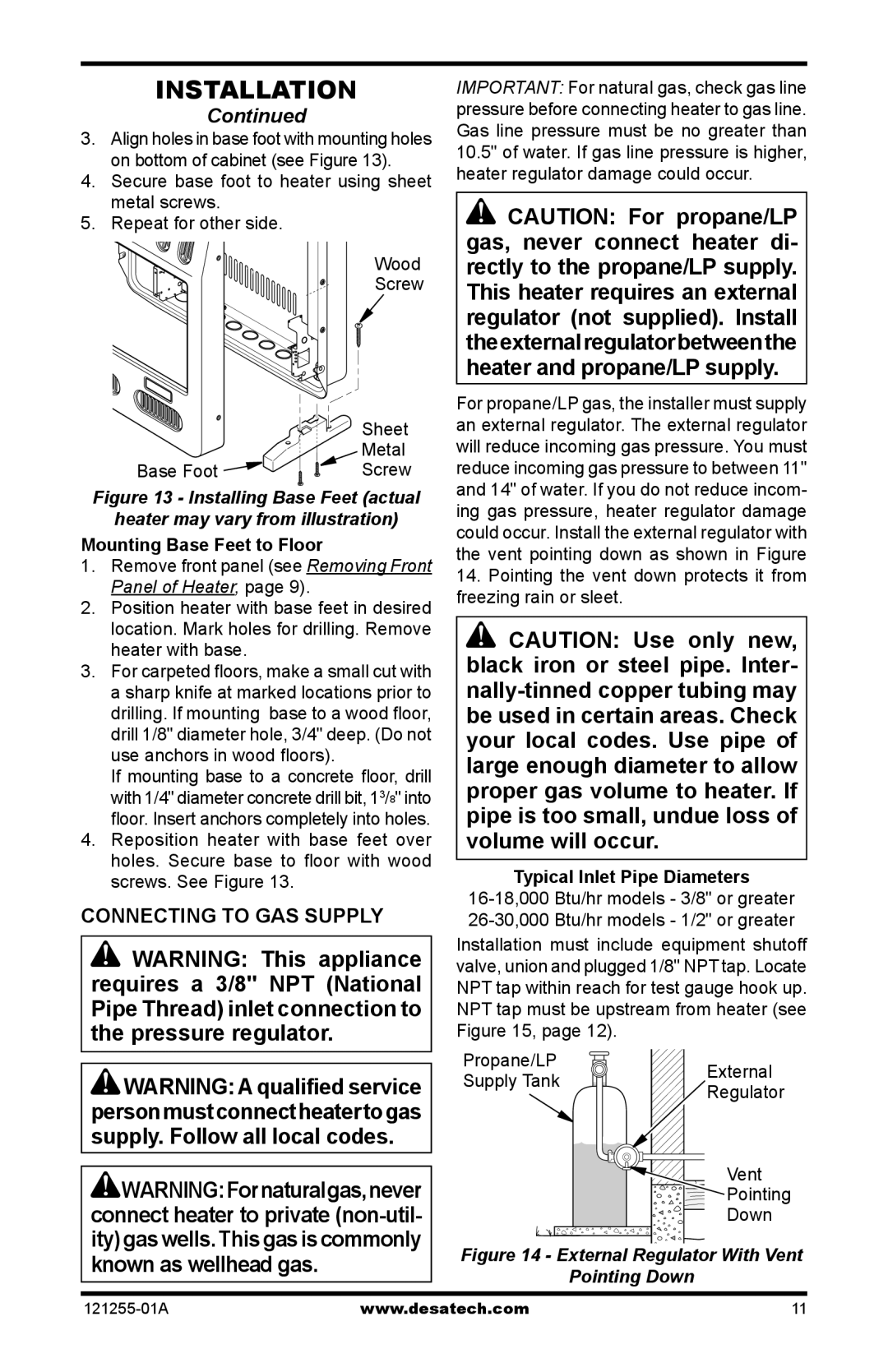
Installation
Continued
3.Align holes in base foot with mounting holes on bottom of cabinet (see Figure 13).
4.Secure base foot to heater using sheet metal screws.
5.Repeat for other side.
Wood
Screw
| Sheet |
| Metal |
Base Foot | Screw |
Figure 13 - Installing Base Feet (actual
heater may vary from illustration)
Mounting Base Feet to Floor
1.Remove front panel (see Removing Front Panel of Heater, page 9).
2.Position heater with base feet in desired location. Mark holes for drilling. Remove heater with base.
3.For carpeted floors, make a small cut with a sharp knife at marked locations prior to drilling. If mounting base to a wood floor, drill 1/8" diameter hole, 3/4" deep. (Do not use anchors in wood floors).
If mounting base to a concrete floor, drill with 1/4" diameter concrete drill bit, 13/8" into floor. Insert anchors completely into holes.
4.Reposition heater with base feet over holes. Secure base to floor with wood screws. See Figure 13.
CONNECTING TO GAS SUPPLY
![]() WARNING: This appliance requires a 3/8" NPT (National Pipe Thread) inlet connection to the pressure regulator.
WARNING: This appliance requires a 3/8" NPT (National Pipe Thread) inlet connection to the pressure regulator.
![]() WARNING: A qualified service personmustconnectheatertogas supply. Follow all local codes.
WARNING: A qualified service personmustconnectheatertogas supply. Follow all local codes.
![]() WARNING:Fornaturalgas,never connect heater to private
WARNING:Fornaturalgas,never connect heater to private
IMPORTANT: For natural gas, check gas line pressure before connecting heater to gas line. Gas line pressure must be no greater than 10.5" of water. If gas line pressure is higher, heater regulator damage could occur.
![]() CAUTION: For propane/LP gas, never connect heater di- rectly to the propane/LP supply. This heater requires an external regulator (not supplied). Install theexternalregulatorbetweenthe heater and propane/LP supply.
CAUTION: For propane/LP gas, never connect heater di- rectly to the propane/LP supply. This heater requires an external regulator (not supplied). Install theexternalregulatorbetweenthe heater and propane/LP supply.
For propane/LP gas, the installer must supply an external regulator. The external regulator will reduce incoming gas pressure. You must reduce incoming gas pressure to between 11" and 14" of water. If you do not reduce incom- ing gas pressure, heater regulator damage could occur. Install the external regulator with the vent pointing down as shown in Figure
14.Pointing the vent down protects it from freezing rain or sleet.
![]() CAUTION: Use only new, black iron or steel pipe. Inter-
CAUTION: Use only new, black iron or steel pipe. Inter-
Typical Inlet Pipe Diameters
Installation must include equipment shutoff valve, union and plugged 1/8" NPT tap. Locate NPT tap within reach for test gauge hook up. NPT tap must be upstream from heater (see Figure 15, page 12).
Propane/LP | External | |
Supply Tank | ||
Regulator | ||
|
Vent
Pointing
Down
Figure 14 - External Regulator With Vent
Pointing Down
www.desatech.com | 11 |
